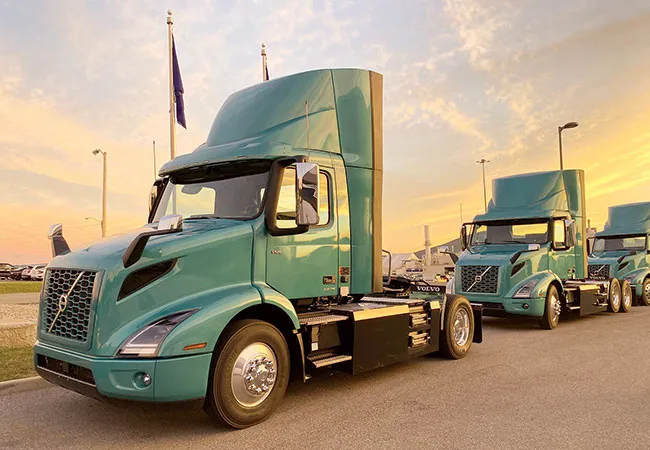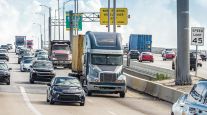Staff Reporter
California Asks Insurers About Covering Zero-Emission Trucks

The Volvo VNR Electric. The California Department of Insurance was directed to conduct surveys to obtain specific information, such as whether an insurance company offers insurance for zero-emission trucks. (Connor Wolf/Transport Topics)
[Stay on top of transportation news: Get TTNews in your inbox.]
The California Department of Insurance is taking steps to ensure that commercial insurance coverage is available for zero-emission heavy trucks and fleets as the state moves to outlaw diesel-powered vehicles.
“We are at the beginning of a major transition to zero-emission trucks, and we know that new technologies can face challenges finding insurance. Commissioner Ricardo Lara is taking a forward-looking approach to identify solutions proactively, before we face problems that slow us down,” Michael Soller, spokesman for the department, told Transport Topics.
In October, Gov. Gavin Newsom enacted Assembly Bill 844, which directed the state Department of Insurance, under the control of the insurance commissioner, to take a series of actions to assist the trucking industry in having available and affordable commercial vehicle insurance for zero-emission heavy vehicles.
The bill was supported during the last session of the California State Assembly by the California Trucking Association, California Department of Insurance, California Environmental Voters and Calstart Inc.

Lara
The goal is to enable the public to know which insurance companies offer insurance for trucks or fleets using different zero-emission technologies and any relevant coverage limits or fleet size specifications.
Another objective is to identify potential barriers for expanding insurance options and provide both state insurance and air quality regulators with critical information for potential state policy changes.
“We are committed to help accelerate the transition to clean-air technology by making sure truck fleets have the tools necessary to access insurance,” Soller noted.

Soller
Already the state Department of Insurance is working to fulfill the legislative requirements of AB 844, requiring the department to issue a notice no later than Feb. 1 to start collecting data from insurance companies to respond with information by May 1. The department was directed to conduct surveys and data calls to obtain specific information, such as whether an insurance company offers insurance for zero-emission trucks.
Company responses are to be kept confidential. However, Lara’s office is required to publish the information in the aggregate without identifying an individual respondent or insurer. Also, the state Department of Insurance is to create and maintain a link on its website providing public access to this aggregate information. The department, in consultation with the California Air Resources Board, is required to make the public aware of information and insurance options for battery-powered, hydrogen-powered, and/or other zero-emission advanced truck technology.
“This data call will allow the department to create a list of insurance companies that provide this coverage,” Soller explained. The department has already “issued a circular to all admitted insurers writing Commercial Auto, which is the line of insurance we identified as being appropriate,” he added.
How does hydrogen fuel cell technology fit into freight transportation? Find out with Parker Meeks, the CEO of Hyzon, a company that designs and manufactures fuel cell technology for heavy-duty transport applications. Tune in above or by going to RoadSigns.ttnews.com.
When asked if there is a penalty for insurance companies failing to provide survey information, Soller said, “The department has an excellent response record to our data calls. We do not foresee this as a problem.”
California’s Department of Insurance is the nation’s largest state consumer protection agency as the state’s regulatory agency for insurance. Nearly 1,400 employees work at the department and oversee more than 1,400 insurance companies and license more than 495,000 agents, brokers, adjusters, bail agents and businesses.
By Jan. 1, 2025, the department must create a strategy to address current and future insurance gaps for new heavy duty truck technologies, including the possible establishment of a risk pool and other tools to offer insurance to truck fleet businesses and individual truck owners unable to find insurance in private insurance markets.
Want more news? Listen to today's daily briefing above or go here for more info
Further, the strategy must evaluate the following:
- The current number of companies offering insurance for zero-emission truck fleets or individual zero-emission trucks
- The impact of existing electric and hydrogen truck insurance policies on emission reductions from the heavy-duty truck sector
- Availability of actuarial loss data for electric and hydrogen trucks, or these types of fleets
- Appropriate coverage limits for zero-emission truck fleets based on common size and characteristics of zero-emission trucking fleets





